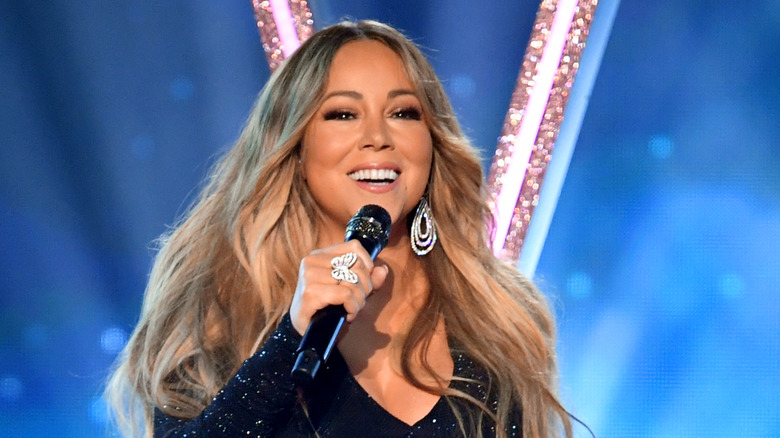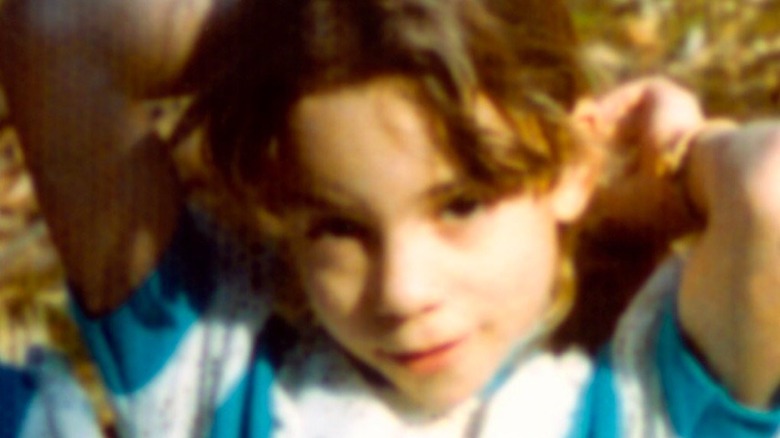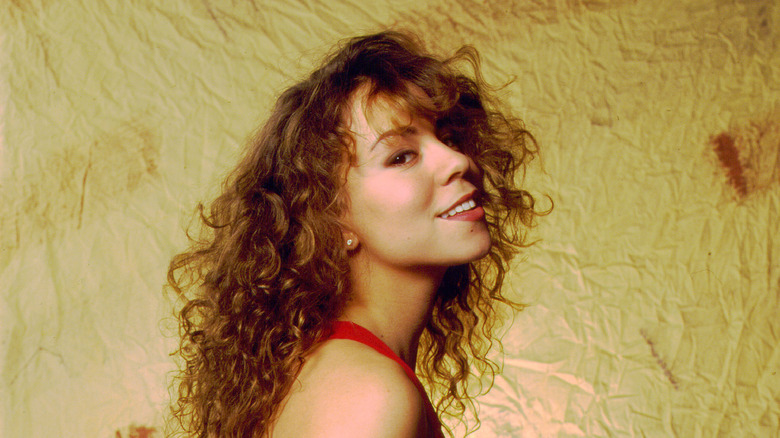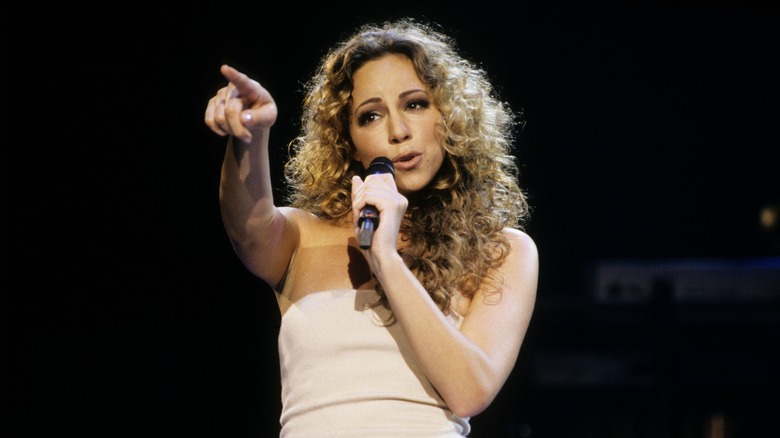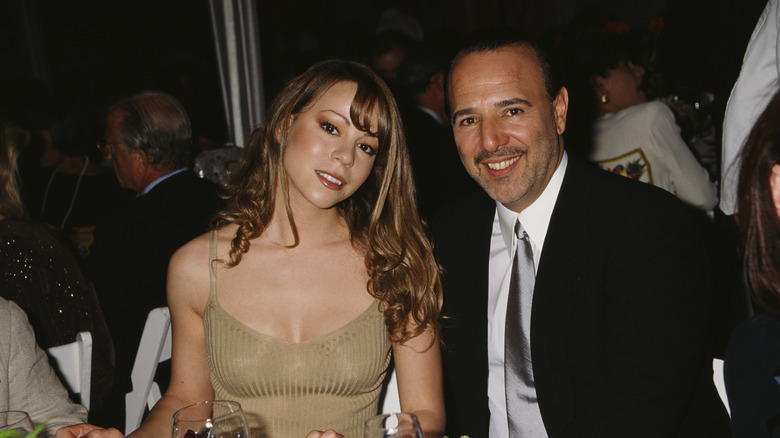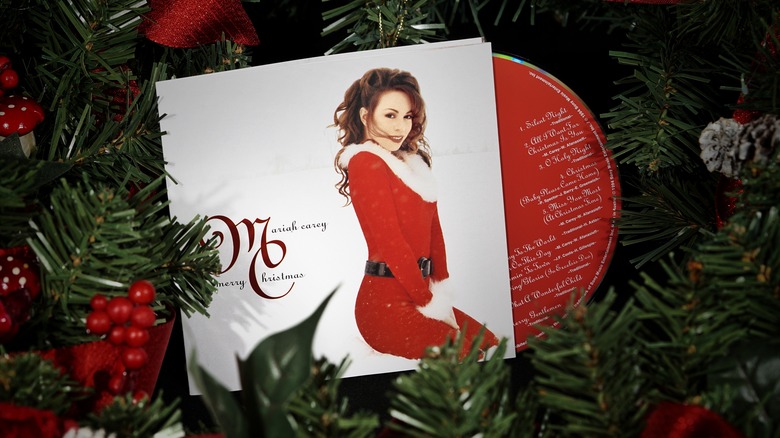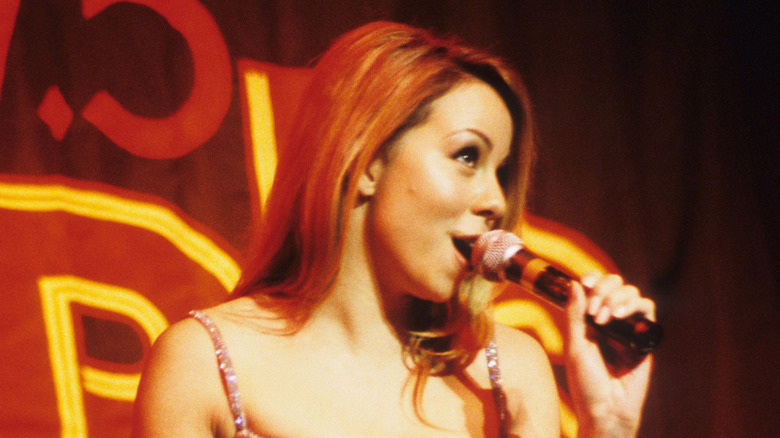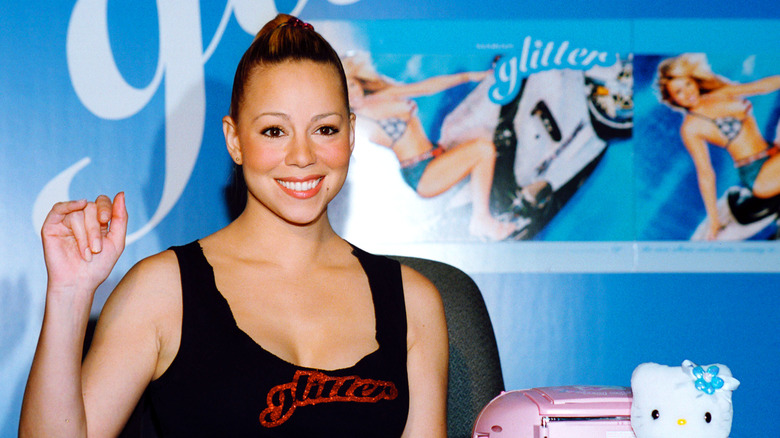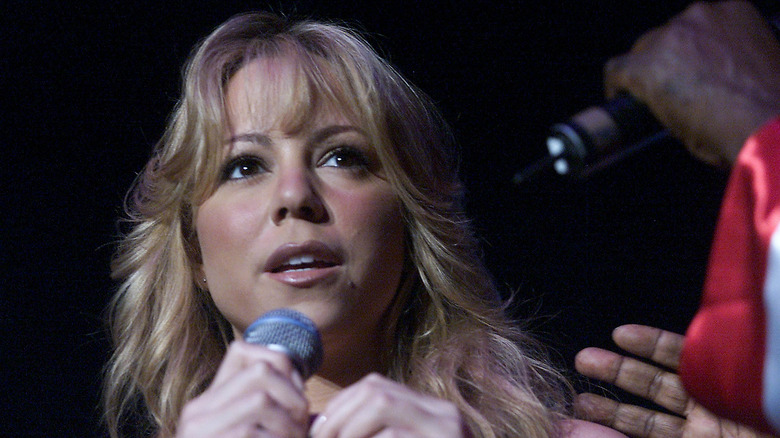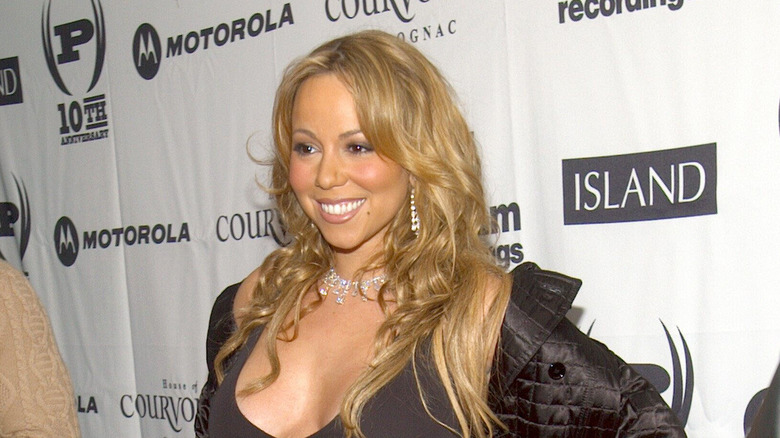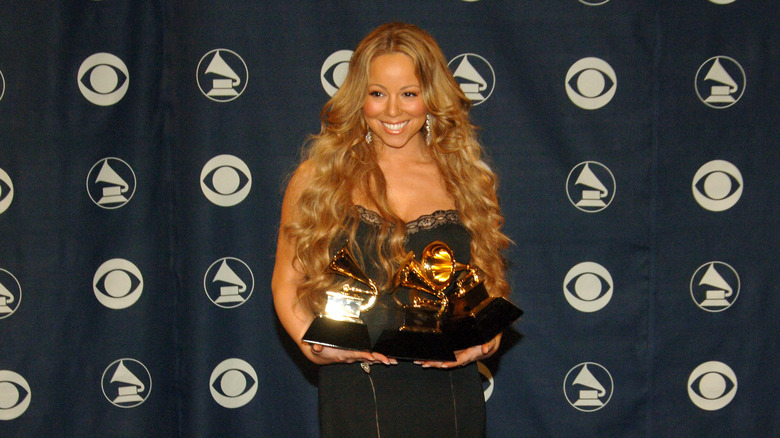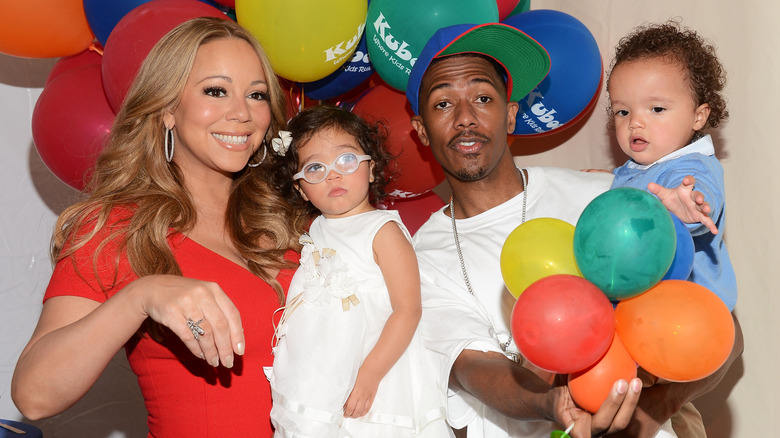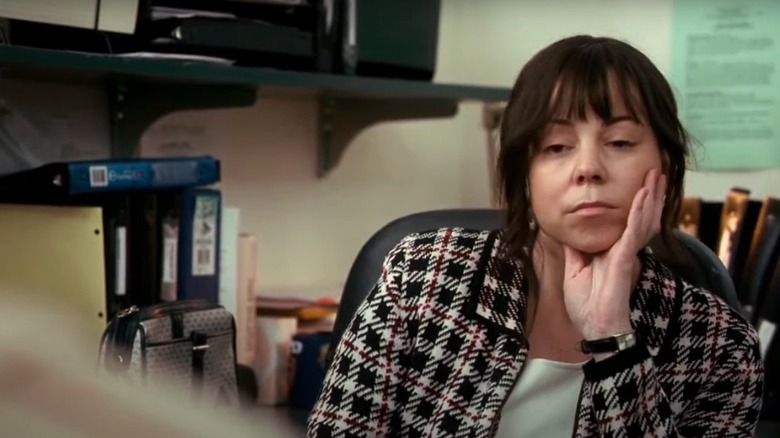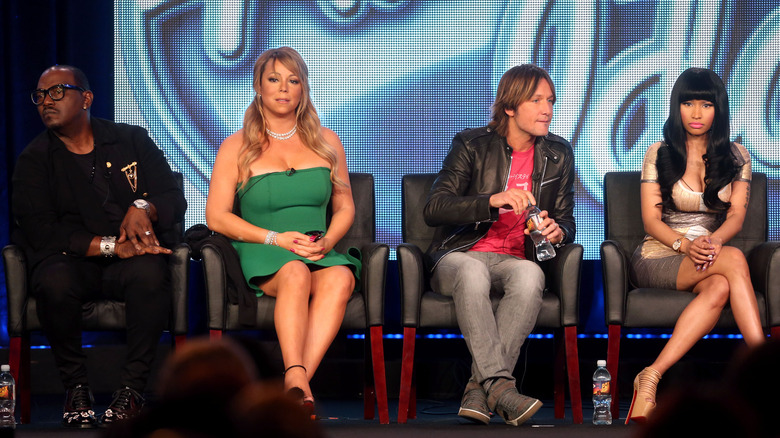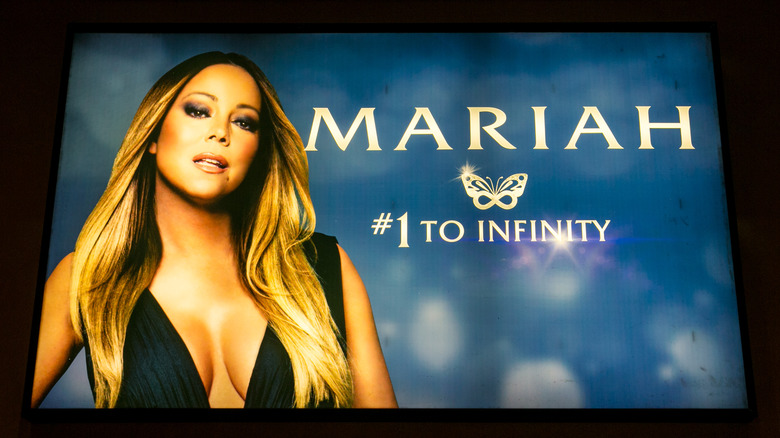The Stunning Transformation Of Mariah Carey From Childhood To 54 Years Old
When it comes to discussing Mariah Carey, it's easy to focus on the obvious. For example, there's her impressive five-octave vocal range (including some stunning whistle tones) and her string of 19 No. 1 hits (so far), the second-highest in music history, topped only by the 20 No. 1s racked up by The Beatles. Further statistics of note include selling more than 200 million albums over the course of a music career that has spanned four decades and counting. Then there's the fact that — unlike some other divas we could mention — Carey writes her own songs; in fact, in 2022 she was inducted into the Songwriters Hall of Fame, while two of her hits — "We Belong Together" and "One Sweet Day" — made Billboard's list of the all-time top 100 hit songs. In 2022, when her holiday classic "All I Want for Christmas is You" returned to the No. 1 spot, she became the first artist to top Billboard's Top 100 chart during four different decades.
In addition to those accolades, Carey has also carved out a parallel career as an actor, taking on several movie roles. These have ranged from acclaimed dramatic performances in "Precious" and "The Butler," to roles where she hilariously played herself in such comedies as "You Don't Mess with the Zohan" and "Girls Trip."
While Carey's public persona has come to epitomize extravagance and opulence, that's certainly not the way her life started out. Read on to experience the stunning transformation of Mariah Carey.
She began performing during a turbulent childhood
Mariah Carey's talent as a vocalist was evident from a young age. As the singer's mother, opera singer Patricia Carey, told People, she discovered her daughter's talent by sheer accident while rehearsing at home before making her debut with the New York City Opera. Her daughter, it turned out, had been paying attention to her practice; "I missed my cue, but Mariah didn't," she recalled. "She sang it — in Italian — at exactly the right point. She wasn't yet three."
Carey began performing at age 4 and was writing songs by the time she was in middle school. For her Juilliard-trained mother, one element of the youngster's vocal abilities stood out. "From the time Mariah was a tiny girl, she sang on true pitch; she was able to hear a sound and duplicate it exactly," Patricia explained.
However, Carey's childhood was far from idyllic. Her father, Albert, divorced Patricia when Carey was a toddler. Meanwhile, Carey has claimed that she felt neglected by her mother while growing up. "I sort of took care of myself a lot," Carey told People. "I always felt like the rug could be pulled out from under me at any time. And coming from a racially mixed background, I always felt like I didn't really fit in anywhere." Meanwhile, Carey has also accused her older siblings of abuse, claiming her sister gave her cocaine when she was 12, left her with third-degree burns, and attempted to set her up with a pimp.
A gig as a backup singer led to a fateful meeting with Tommy Mottola
When she was 18, Mariah Carey supported herself in New York City by waitressing. Behind the scenes, however, she was pursuing a career in music, recording demos, and working part-time as a backup singer for Brenda K. Starr. When Starr invited Carey to a 1988 party hosted by Columbia Records, she used the opportunity to get her demo tape to record exec Jerry Greenberg.
Just as she handed him the tape, another hand reached out and took it. That hand, she told The Washington Post, belonged to Columbia president Tommy Mottola. "It was such a quick thing," Carey recalled. "Jerry's hand went out and Tommy's came in from the side and just grabbed it." After exiting the party, Mottola played Carey's tape through his car stereo, and couldn't believe what he was hearing. "An unbelievable energy was running through me, screaming, 'Turn the car around! That may be the best voice you've ever heard in your life!'" he wrote in his memoir, "Hitmaker" (via New York Post). He raced back to the party to find Carey, only to discover she'd left. He eventually tracked her down and signed her to his label.
Mottola immediately took control of her career, sparing no expense to ensure her launch was perfect. After shelling out $1.8 million to record her debut album, Mottola then ordered reshoots for her first music video, "Visions of Love," costing $500,000.
Her 1990 debut was a Grammy-winning blockbuster
All the money that Tommy Mottola spent bringing in top producers to work with his new discovery paid off when Mariah Carey's self-titled 1990 debut became the biggest album of the year. "Mariah Carey" sold in excess of 15 million copies, spending 11 consecutive weeks at the top of the Billboard album chart. When four of the album's tracks — "Vision of Love," "Love Takes Time," "Someday," and "I Don't Wanna Cry" — hit No. 1, she tied a record set in 1969 by The Jackson 5.
The following year, the 20-year-old singer won two Grammy Awards, for Best New Artist and Best Female Pop Vocal Performance for "Vision of Love." Mottola was eager to strike while the iron was hot, and he got Carey back in the studio to record a follow-up. That album, "Emotions," came out just a few months after her Grammy wins, and proved to be another hit. When the title track soared to No. 1, Carey made chart history as the only artist whose first five singles charted at the top spot.
"It seems like everything I did in that first year, that I came out with my first album was like a blur, because everything happened so fast for me that I never had the chance to sit down and go, 'Wow, this is actually happening,'" Carey told MTV, looking back on furious pace she maintained early in her career.
Her marriage to Tommy Mottola was isolating
In 1993, Mariah Carey's relationship with Tommy Mottola veered from professional to personal when they tied the knot in a lavish wedding with a guest list that included the likes of Bruce Springsteen and Barbra Streisand. The newlyweds then moved into a 22,000-square-foot mansion Carey dubbed Storybook Manor.
Their marriage, however, was a far cry from the fairytale wedding. Carey — who was just 23 when she married the 44-year-old music mogul — later alleged that her husband took control of all aspects of her life, not just her career. "I was a kid in his world, and I just kept making money for the company. Just kept goin' in and making records and making records and writing songs and feeding the machine. And I was living my dream, but it was also a nightmare," she told "CBS Sunday Morning."
Speaking with Meghan Markle for her "Archetypes" podcast (as reported by Hello!), Carey said that she found herself to be the proverbial songbird imprisoned in a golden cage. "My first marriage, I was very much ... what's the word, locked away," Carey said. "I was given the rules and had to stick with them." Carey began to feel increasingly isolated as Mottola kept her from seeing her friends and family. "I couldn't talk to anyone that wasn't under Tommy's control," she wrote in her 2020 memoir, "The Meaning of Mariah Carey," as excerpted by Us Weekly, claiming that Mottola monitored her every movement. Carey and Mottola split in 1997.
How one single led her to become the Queen of Christmas
In 1994, Mariah Carey unveiled her first-ever holiday album, "Merry Christmas," produced by Walter Afanasieff. Speaking with Billboard, Afanasieff admitted he had no idea the album would go on to become a classic. "Back then, you didn't have a lot of artists with Christmas albums," he said. "So we were going to release it as kind of an everyday, 'Hey, you know, we're putting out a Christmas album. No big deal.' To think of it as a single that's going to No. 1 ... we didn't have an inkling of that."
The standout track was "All I Want for Christmas is You," which re-entered the public consciousness in a big way when it was included in the hit 2003 movie "Love Actually." Every year since then, noted E! News, the song has made an annual reappearance in the charts during the holiday season; a 2017 report in The Economist estimated that Carey had earned more than $60 million from that one song.
The song's enduring popularity led Carey to be nicknamed the "Queen of Christmas" — a title that Carey insisted she did not confer upon herself. "Really? I'm gonna do that?" she quipped during an appearance on "The Late Show with Stephen Colbert." "They can look up every interview I've ever done, and not to get super religious, but I was like, 'I think, like, if anybody would be the 'Queen of Christmas,' that would be Mary."
1997's Butterfly announced a bold new direction for Mariah Carey
In the wake of her 1997 separation from Tommy Mottola (their divorce was finalized in 2000), Mariah Carey began work on "Butterfly," the album that would change her path. Reportedly itching to step out of the wholesome image her record company had built, Carey celebrated her independence by delving into hip-hop and rap sounds, collaborating with the likes of Da Brat, Jermaine Dupri, and Sean "Diddy" Combs. Her collab with Jay-Z, "Heartbreaker," rocketed to No. 1 in 1999. That particular chart achievement was a milestone, resulting in Carey becoming the first artist to chart a No. 1 during each year of the 1990s.
"[The record] is something that was written and recorded in such a pivotal moment in my life. It was a turning point where I was leaving a difficult, to say the least, relationship, a very controlling relationship, and it was time for me to get out of that. I literally had to do it to save my own life," Carey told Harper's Bazaar.
Along with her grittier new sound, Carey debuted a fresh look, wearing hot new fashions by such designers as Tom Ford, Versace, and Gucci. That was all part of the personal metamorphosis she was undergoing at the time, symbolized in the album's title. "I had to transform internally to become strong enough to leave that relationship and to be empowered enough to fly — metaphorically speaking — as a grown woman on my own," she explained.
Her movie debut was a spectacular flop
The year 2001 was a difficult one for Mariah Carey. Professionally, everything was going great for the recently divorced and newly emancipated singer as she prepared for the release of her first motion picture, "Glitter." Accompanied by a soundtrack album of new music, "Glitter" was meant to be her launchpad to movie stardom. In the quasi-autobiographical film, Carey starred as aspiring singer Billie Frank, who meets an influential nightclub DJ who helps her launch a music career.
The end result, however, was far from what had been hoped. "Glitter" proved to be a box-office debacle. Beset by scathing reviews, its release date was pushed back due to Carey's headline-making personal issues (more on that in a moment), and the film brought in just $5.2 million worldwide — not even coming close to earning back its $22-million budget. As Carey has frequently pointed out, it didn't help that the film opened days after the tragic 9/11 terror attack. "The tragedy was still fresh," she wrote in her memoir, via Us Weekly, "and no one was ready for the lightweight distraction that was 'Glitter.'"
In 2002, Carey admitted that while she'd written the original treatment for "Glitter," it ultimately got away from her. "It started out as a concept with substance, but it ended up being geared to 10-year-olds," she told USA Today. "It lost a lot of grit. It was gritless, in fact. I kind of got in over my head."
Erratic behavior and a public breakdown
While Mariah Carey was gearing up for the arrival of "Glitter," she checked herself into a hospital for what was described at the time as severe exhaustion. Soon after that, Carey's publicist, Cindy Berger, confirmed at least some of the rumors that had been swirling around the singer. "She has suffered an emotional and physical breakdown," Berger told the Associated Press, via The Washington Post. "She is under psychiatric care."
In a subsequent interview for an MTV special, Carey backtracked on her publicist's claims of a breakdown, insisting she was simply exhausted from the demands being placed on her. "There has been so much written and reported about me over the past year ... and I've been pretty quiet up until now," she said, as reported by ABC News. "It wasn't like I went schizo and needed to be put in a straitjacket or tried to kill myself, what they were saying. I just think it's time to set the record straight."
What wasn't reported at the time was that Carey had been diagnosed with bipolar disorder, something she revealed nearly 20 years later in an interview with People. "I didn't want to believe it," she said of the diagnosis, explaining why she hadn't opened up about it previously. "Until recently I lived in denial and isolation and in constant fear someone would expose me," she said. "It was too heavy a burden to carry and I simply couldn't do that anymore."
If you or someone you know is struggling with mental health, please contact the Crisis Text Line by texting HOME to 741741, call the National Alliance on Mental Illness helpline at 1-800-950-NAMI (6264), or visit the National Institute of Mental Health website.
Her $80-million record deal with Virgin went south
In April 2001, Mariah Carey severed ties with Columbia. She jumped ship by signing a four-album, $80 million deal with Virgin Records that was reported to be one of the biggest deals in the history of the entertainment industry. She received a $20 million advance upon signing with Virgin, a subsidiary of British music giant EMI. It was reported, and the label confirmed, that her first single for the label would be a song from "Glitter," with the film's soundtrack to be her first Virgin release.
Following Carey's headline-making hospitalization, and both the "Glitter" movie and soundtrack bombing, Carey's deal with Virgin cratered. In January 2002 — just eight months after she signed on — The New York Times reported that the company was cutting her loose after she'd recorded just one album for the label. To exit the deal, however, EMI was forced to pay out $28 million to Carey.
According to the Times, Carey addressed being dropped by EMI by referencing a lyric from rap group A Tribe Called Quest. ”It goes like this. Something like, 'Industry Rule No. 480: Record company people are shady,'" she said, adding, "Jobs change, and people change positions." Meanwhile, Carey already had some other gigs lined up, including singing the U.S. national anthem at the 2002 Super Bowl and making her second movie, co-starring with Mira Sorvino in "WiseGirls."
The Emancipation of Mimi put her back on track — and in the record books
A few months after being dumped by Virgin, Mariah Carey signed with Island/Def Jam. Her first release for her new label arrived later that year: 2002's "Charmbracelet."
It was her next release, however, that propelled Carey back to the top: "The Emancipation of Mimi." Released in 2005, the album featured a heavy dose of rap, including appearances by Snoop Dogg and Nelly. "It ended up being this party, where Nelly was in one room and Snoop in the other, and we made a couple of records together," Carey told USA Today. The album was a smash, heralding Carey's comeback — something that was impossible to deny when the single "We Belong Together" spent 14 weeks on the Billboard charts, more than any other single that year. As the album's producer, Jermaine Dupri, told MTV News, its success erased the controversy that characterized Carey just a few years earlier. "It's like, damn, two years ago she was the craziest person in the funny farm, and that [image] don't even exist no more," he said.
"The Emancipation of Mimi" received multiple Grammy nominations, and Carey took home three, including Album of the Year. Carey also made Billboard chart history when "We Belong Together" remained at No. 1 while another album track, "Shake It Off," landed at No. 2 — only the second time ever that a female recording artist had achieved that rare feat.
She married Nick Cannon and embraced motherhood
Mariah Carey was first linked to Nick Cannon when he appeared in her 2008 "Bye Bye" music video. After a whirlwind romance, the two secretly wed a few months later. This time, Carey was the elder in the equation; she was 42 years old while Cannon was 30. "I'd always admired Mariah from afar, but once we connected I felt it was destined: This has to be my wife," Cannon told People. "We really do feel we are soulmates," added Carey.
In 2011, the couple welcomed twins Morrocan and Monroe. Just a few years later, however, the marriage began unraveling, with rumors alleging marital strife. In the wake of reports they'd separated, Cannon filed for divorce, and the divorce was finalized in 2016. In her memoir, "The Meaning of Mariah Carey," Carey explained why the marriage derailed. "Making the necessary adult adjustments to being working parents in entertainment took its toll on our relationship," she wrote, as excerpted in Stylecaster, "and the end of our marriage came fast, as it began." She also admitted that neither fought very hard to keep it together. "Honestly, I think Nick and I could have worked it out between the two of us, but egos and emotions got inflamed ... " she wrote.
Since then, the exes have gotten over any issues and continue to co-parent their kids. "I think Nick and I have done pretty well in co-parenting, staying friends with each other so that we can talk," she told People.
Mariah Carey established herself as an actor after the notoriety of Glitter
The "Glitter" catastrophe would surely have quelled most singers' acting ambitions, but Mariah Carey persevered. She took another kick at the can in the 2002 film "WiseGirls," and that same year guest starred in an episode of "Ally McBeal."
A few years later, she returned to acting even more seriously when she portrayed an abused wife in the 2008 film "Tennessee." That film's producer, Lee Daniels, had been so impressed with her work in "Tennessee" that when Helen Mirren backed out of playing a Harlem social worker in "Precious," Daniels offered the role to Carey. He did, however, warn her that he was expecting an actor to show up on the set, not a diva. "If you come with a strip of makeup on, I will have a backup [actor]," Daniels recalled telling her, via LiveJournal.
Carey admitted that going makeup-free was akin to torture. "Lee, come on, I had no makeup underneath my eyes and the overhead lighting was not my friend," she jokingly complained during a press conference, as reported by Rolling Stone. Ultimately, however, Carey came to appreciate her unvarnished look in the movie. "But it was cool because a lot of people say they don't recognize me in the film," she added. "They don't know it's me and, to me, that was a great gift that [Daniels] gave me to be able to really go that far away from who I am."
A volatile year on American Idol
Mariah Carey came to television in 2012 when she was hired as a judge on "American Idol," alongside returnee Randy Jackson and fellow newbies Keith Urban and Nicki Minaj. Carey and Minaj clashed immediately. That came bursting into public when a video from the set leaked to TMZ, featuring the two engaged in a vicious argument. "I told them, I'm not f***ing putting up with your f***ing highness over there," Minaj complained, causing Carey to dramatically declare, "Why do I have a three-year-old sitting around me?"
Carey soldiered through until the finale, but did not return to the judging table for the subsequent season. Asked about the experience during an interview with Hot 97, via CNN, she did not recall the experience fondly. "Honestly, I hated it," she said. "It was like hell. It was like going to work every day in hell with Satan."
During a 2015 appearance on Australia's "Kyle and Jackie O Show," Carey was asked if she would ever return to the show. "Hell no! Absolutely not. That was the worst experience of my life," she responded. Without getting into details, she implied that producers had fuelled her feud with Minaj. "Pitting two females against each other wasn't cool," she said. Carey also recalled her "Idol" season during an appearance on "Jimmy Kimmel Live!" and continued to dredge up painful memories of her judging stint. "It was bleak, darling," she said. "It was a bleak experience."
Years of success in Las Vegas and 'new music on the horizon'
In the wake of her "American Idol" stint, Mariah Carey dropped by "The Ellen DeGeneres Show" to announce she was planning to perform at her first residency in Las Vegas. "It's a new chapter for me and I'm just excited about it," said Carey of the show, titled "Mariah #1 to Infinity," which was set to feature her singing all 18 of her No. 1 songs. The residency proved to be a massive success, keeping her in Vegas for more than two years before finally winding down in 2017.
The following year, she announced her return to Vegas with a new residency, "The Butterfly Returns," which promised to include her two children, Monroe and Moroccan, joining her to perform "Always Be My Baby." In 2019, she announced she was heading back to Vegas. During the holiday season, she revived her "All I Want for Christmas is You" residency (which initially ran in NYC's Beacon Theater in 2014), followed in the spring of 2020 by the return of "The Butterfly Returns."
Meanwhile, in late 2023 she revealed some new music was in the works — a thrill for fans, given she hadn't released a new studio album since 2018. "There is new music on the horizon," Carey told "Good Morning America." "I've been working ... on just writing new songs. Yesterday we were in the studio working on something with a choir, working on a new song. So it's exciting."

